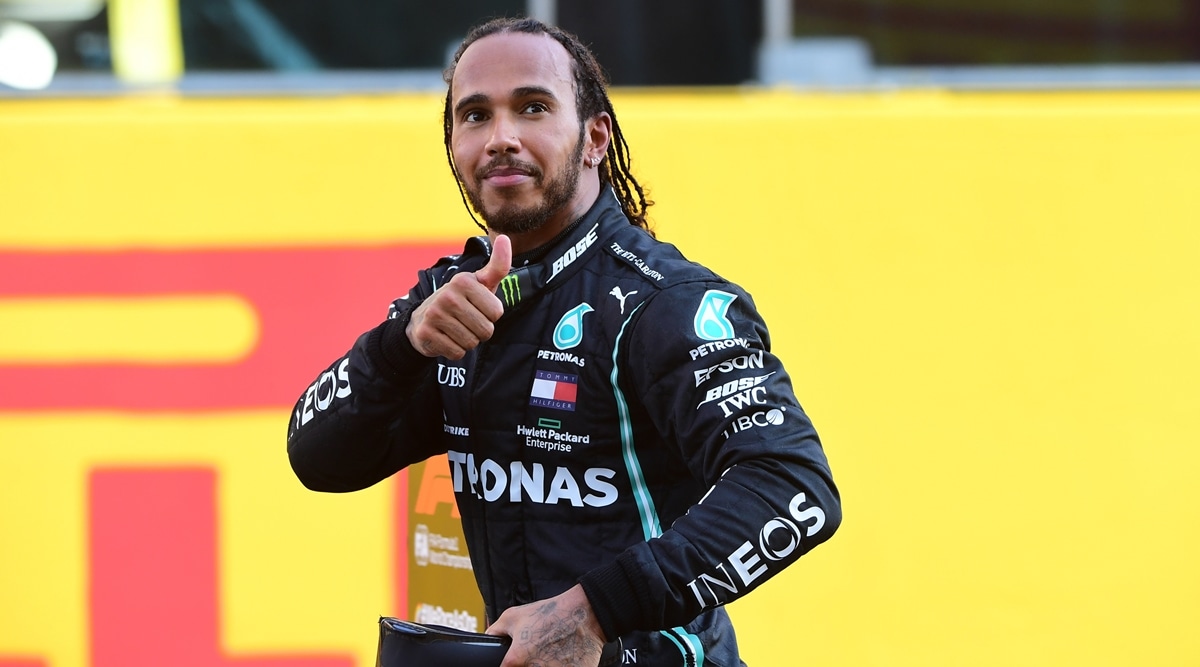Lewis Hamilton continues his assaults on Michael Schumacher’s records – the ones that were meant to be untouched and pristine.
Lewis Hamilton continues his assaults on Michael Schumacher’s records – the ones that were meant to be untouched and pristine. On Sunday, the Brit overtook the record of 91 Formula One races that the German legend had stacked up during his career. Hamilton did so at the Portuguese Grand Prix, a race that was added to the F1 calendar after a gap of 24 years.
With a 77-point lead in the driver’s championship and a mere five races left in the season, it seems like Hamilton will equal the one record that truly puts his name right up there with the German great – seven world championships.
This season has seen frequent comparisons between the careers of the two racing greats. The German’s records and his five-year period of dominance with Ferrari was considered to be one of the greatest achievements in sport and matching it, let alone overtaking it, had always been considered a mountain too high to climb. That, however, has changed in the last few years, with Hamilton conquering one peak after another in his Mercedes.
Times, they are a-changin
Schumacher raced with Benetton and Ferrari during the era of F1 cars being able to refuel in the middle of the race. Simply put, this allowed cars at the back of the grid a chance to overtake because a higher load of fuel meant fewer pit-stops. This strategy was further boosted by the quality of Bridgestone tyres used by teams back in the day. Bridgestone tyres didn’t suffer from rapid degradation that modern-day F1 cars struggle to cope with – as was seen in the Portuguese GP with Hamilton initially struggling to warm his tyres up and being overtaken by teammate Valtteri Bottas.
The F1 of today doesn’t allow refuelling. This essentially gives the qualifier in pole position the best possible chance of winning the race. Hamilton is the greatest driver of his generation because he has qualified in pole position for 97 of his 262 races. Schumacher, on the other hand, has a record of 68 poles in 306 starts. This shows that both drivers were the greatest of their respective generations because they managed to make the best out of the rules and machinery of the day.
Quality of rivals
Their different paths in different eras was also made possible by the quality of their rivalries. The making of Schumacher was his intense battles with Briton Damon Hill in the early years of his career and later, Finnish driver Mika Hakkinen and had it not been for a lifetime of unreliable cars built by McLaren for Hakkinen, Schumacher’s records could have looked a lot different.
For Hamilton, the what-ifs start and end with Nico Rosberg. Sebastian Vettel did have a four-year hold over the World Championship from 2010-13 with Red Bull but it came at a time when McLaren and Hamilton just never seemed to have the acceleration to match Christian Horner and Adrian Newey’s work of art.
Rosberg truly challenged Hamilton because of their history, because they were teammates and because of what the rivalry did for both of them. Having been friends since their go-karting days, both their careers were entwined and finally exploded in the 2015 and 2016 seasons.
It culminated in Rosberg finally winning his first F1 title in 2016 – a season of inter-team rivalry the F1 had never witnessed to that extent. The Finnish-German driver promptly retired and in later interviews, spoke of how the ‘taxing season’ played a big part in him quitting the sport while he was ahead. Would Hamilton have got six, possibly seven world titles in a few weeks, if Rosberg stuck around? The jury is out on that.
The numbers game
The point system in Formula One means that the Top 10 drivers inevitably pick up some gains in the drivers’ championship after a race. What made Schumacher stand out, though, was his ability to find a place among the top three on a consistent basis. Hamilton has crossed the chequered flag first 56 times when he has started from pole position, as compared to the 40 enjoyed by Schumacher. But the German has more victories from second position and more than double Hamilton’s victories from third position.
Schumacher edges out Hamilton on the number of fastest laps he has recorded with 77 to 52. But Hamilton has amassed 4,076 points over Schumacher’s 3,961 – and has done so despite racing in five fewer seasons than the German.
Both the greats have their favourite tracks to thank as well. Hamilton remains hungry in Hungary, having won eight of his 92 at Hungaroring. He has added to that with seven wins each at the Canadian GP and on his home turf at Silverstone. Schumacher’s best performances have come at the Canadian GP with seven wins, followed by six each at the famed Spa-Francorchamps circuit in Belgium and the Japanese GP.
Outside track
If there is one aspect where Hamilton clearly edges out Schumacher, it is this – he is a modern-day great who believes that his position in Formula One, and society in general, allows him to take social justice stands that his German counterpart was never really known for. Hamilton has had the influence to push this era of Formula One to stand in solidarity with the Black Lives Matter movement.
Be it the #EndSars t-shirt he wore for a pre-race interview this week or his displeasure at the FIA choosing Vitaly Petrov (Former F1 driver critical of Hamilton’s BLM stand) as a race steward – Hamilton has ensured that when posterity looks back at his career, he will be seen on the right side of history, and not just because of his exploits on the racing track.
Source: Read Full Article


